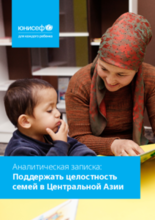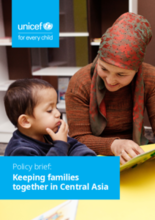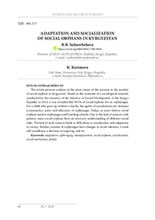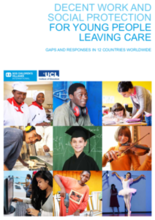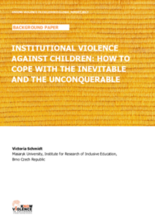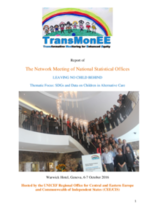Displaying 1 - 10 of 18
Panama, Uganda, Sri Lanka and Czech Republic among those newly committing to totally prohibit violence against under-18s.
Каждый ребенок имеет право расти в способствующей развитию семейной среде.
This UNICEF policy brief finds that an estimated 203 children for every 100,000 children live in residential care across Central Asia – almost double the global average of 105 per 100,000. In this brief, UNICEF proposes seven policy recommendations to facilitate the closure of large-scale institutions and transition to family-based alternatives to institutional care in Central Asia.
This article from UNICEF describes the increased risks and vulnerabilities faced by children left behind by migration in Kyrgyzstan due to the COVID-19 crisis, and how UNICEF and its partners are responding to meet their needs.
This article presents analyses of the main causes of the increase in the number of social orphans in Kyrgyzstan.
This consultancy is aimed at providing technical assistance to the Government and to UNICEF Kyrgyzstan in identifying country level risks and opportunities facing children who are or may be returned from former ISIL controlled territory.
The aim of this report from SOS Children's Villages is to increase the knowledge and understanding of the needs and rights of young people ageing out of alternative care around the world, in order to inform strategies, policies and services to improve their life chances and outcomes through appropriate preparation for leaving care as well as after-care support.
This report summarizes the main findings of the ‘Study on Violence against Women and Violence against Children,’ conducted in Albania, Belarus, Kazakhstan, the Kyrgyz Republic, Moldova, Turkey and Ukraine from 2016 to 2017, to identify major areas of overlap between intimate partner violence (IPV) and violence against children (VAC).
This paper, produced for the Know Violence global learning initiative, looks at the violence children experience in closed institutions in the Central Asian countries, specifically the former Soviet republics: Kazakhstan, Kyrgyzstan, Tajikistan and Uzbekistan.
This document summarizes the content of the 6-7 October 2016 Network Meeting of National Statistical Offices. The event comprised of a number of presentations on topics related to the SDGs and data on children in alternative care.

